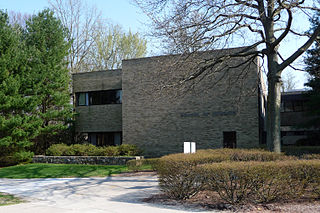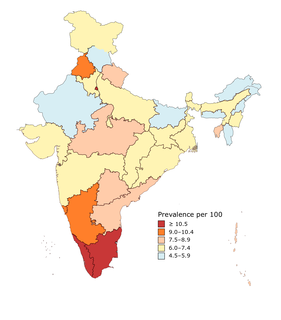
Preventive healthcare, or prophylaxis, consists of measures taken for disease prevention. Disease and disability are affected by environmental factors, genetic predisposition, disease agents, and lifestyle choices and are dynamic processes which begin before individuals realize they are affected. Disease prevention relies on anticipatory actions that can be categorized as primal, primary, secondary, and tertiary prevention.

Joslin Diabetes Center is the world's largest diabetes research center, diabetes clinic, and provider of diabetes education. It is located in the Longwood Medical and Academic Area in Boston, Massachusetts, United States. Among the Harvard Medical School affiliated institutions, Joslin is unique in its sole focus on diabetes. Joslin has the world's largest team of board-certified physicians treating diabetes and its complications, as well as the largest staff of Certified Diabetes Educators anywhere in the world. Joslin also supports the world's largest diabetes research team with more than 40 faculty investigators and more than 300 researchers.
Behavior change, in context of public health, refers to efforts put in place to change people's personal habits and attitudes, to prevent disease. Behavior change in public health is also known as social and behavior change communication (SBCC). More and more, efforts focus on prevention of disease to save healthcare care costs. This is particularly important in low and middle income countries, such as Ghana, where health interventions have come under increased scrutiny because of the cost.
Qatar Foundation for Education, Science and Community Development is a semi-private chartered, non-profit organization in Qatar, founded in 1995 by then-emir Sheikh Hamad bin Khalifa Al Thani and his second wife Moza bint Nasser. In addition to private funding, it is government-supported and in some ways government-funded. Qatar Foundation (QF), chaired by Sheikha Moza bint Nasser, has spearheaded Qatar's endeavors to establish itself as a leader in education, science, and cultural development on both a regional and global scale. QF has stated an aim "to support Qatar on its journey from a carbon economy to a knowledge economy by unlocking human potential."
The American Diabetes Association (ADA) is a United States-based nonprofit that seeks to educate the public about diabetes and to help those affected by it through funding research to manage, cure and prevent diabetes. It is one of many non-profit organizations that have emerged as an official institution by the American public and that highly influence and at times work in tandem with the government and healthcare system. The ADA receives donations from individual donations, foundations and companies to support their mission.
The Science, Mathematics, And Research For Transformation (SMART) Defense Scholarship Program was tested as a program in 2005 under the Air Force Office of Scientific Research. SMART was fully established by the National Defense Authorization Act for fiscal year 2006, and was assigned to the Navy Postgraduate School (NPS) as the managing agency in late 2005-early 2006.

The International Diabetes Federation (IDF) is an umbrella organization of over 230 national diabetes associations in more than 160 countries and territories. It represents the interests of the growing number of people with diabetes and those at risk. IDF’s mission is to promote diabetes care, prevention and a cure worldwide. The Federation has been leading the global diabetes community since 1950. It is headquartered in Brussels, Belgium.

Health literacy is the ability to obtain, read, understand, and use healthcare information in order to make appropriate health decisions and follow instructions for treatment. There are multiple definitions of health literacy, in part, because health literacy involves both the context in which health literacy demands are made and the skills that people bring to that situation.
The Barry M. Goldwater Scholarship and Excellence in Education Program was established by the United States Congress in 1986 in honor of former United States Senator and 1964 presidential candidate Barry Goldwater. Its goal is to provide a continuing source of highly qualified scientists, mathematicians, and engineers by awarding scholarships to college students who intend to pursue careers in these fields.

The Marion Peckham Egan School of Nursing and Health Studies is a graduate and undergraduate nursing school and one of the professional schools of Fairfield University located in Fairfield, Connecticut, United States. The school offers graduate and undergraduate programs, according to the National League for Nursing (NLN) and Commission on Collegiate Nursing Education (CCNE) and ranks among the "10 Best Colleges for a Degree in Nursing" according to Bright Hub.

The Brown School at Washington University in St. Louis is one of the world's leading schools for the training of social science researchers. The Brown School offers a Master of Social Work (MSW), a Master of Public Health (MPH), a Master of Social Policy, a PhD in Social Work, and a PhD in Public Health Sciences. The social work school and public health programs are top-ranked by US News. As one of the academic units of Washington University in St. Louis, the Brown School was founded in 1925 as the department of social work. The school was endowed in 1945 by Bettie Bofinger Brown and named for her husband, George Warren Brown, a St. Louis philanthropist and co-founder of the Brown Shoe Company. The school was the first in the country to have a building for the purpose of social work education, and it is also a founding member of the Association of Schools and Programs of Public Health. The school is housed within Brown, Goldfarb, and Hillman Halls.
The St. Vincent Declaration is a set of goals for the health care of people with diabetes mellitus published as the product of an international conference held in St. Vincent, Italy, on 10–12 October 1989. Representatives of government health departments and patients' organizations from all European countries met with diabetes experts under the aegis of the World Health Organization (WHO) Europe and the International Diabetes Federation (IDF) Europe. General standards for diabetes care were agreed on, as well as plans for improving care in participating countries toward the goals. Twenty years later, in 2009, it was stated in an editorial in the British Journal of Diabetes and Vascular Disease that 'despite the progress made following the St. Vincent Declaration and the UN Resolution, significant gaps still exist and urgent action is needed to stem this rising epidemic'.
Although a variety of infectious diseases existed in the Americas in pre-Columbian times, the limited size of the populations and interactions between those populations hampered the transmission of communicable diseases. One notable infectious disease of American origin is syphilis. Aside from that, most of the major infectious diseases known today originated in the Old World. The American era of limited infectious disease ended with the arrival of Europeans in the Americas and the Columbian exchange of microorganisms, including those that cause human diseases. Eurasian infections and epidemics had major effects on Native American life in the colonial period and nineteenth century, especially.
Obesity in the Middle East and North Africa is a notable health issue. Out of the 15 fattest nations in the world as of 2014, 5 were located in the Middle East and North Africa region.

Dr. V. Mohan is an Indian diabetologist. He is the Chairman and Chief of Diabetology at Dr. Mohan’s Diabetes Specialities Centre, which is an IDF Centre of Excellence in Diabetes address Care. He is also the President and Director of the Madras Diabetes Research Foundation in Chennai which is an ICMR Center for Advanced Research on Diabetes.
The National Institute of Diabetes and Digestive and Kidney Diseases (NIDDK) is part of the United States National Institutes of Health, which in turn is part of the Department of Health and Human Services. NIDDK is approximately the fifth-largest of the 27 NIH institutes. The institute's mission is to support research, training, and communication with the public in the topic areas of "diabetes and other endocrine and metabolic diseases; digestive diseases, nutritional disorders, and obesity; and kidney, urologic, and hematologic diseases". As of 2015, the Director of the institute is Griffin P. Rodgers, who assumed the position on an acting basis in 2006 and on a permanent basis in 2007.
The American Association of Clinical Endocrinology (AACE) is a professional community of physicians specializing in endocrinology, diabetes, and metabolism committed to enhancing the ability of its members to provide the highest quality of patient care. Formerly known as the American Association of Clinical Endocrinologists, AACE is the trusted voice of clinical endocrinologists, primary care physicians and other healthcare professionals who treat patients with endocrine conditions and disorders. AACE's mission is elevating clinical endocrinology to improve global health. The association is headquartered in Jacksonville, Florida, US.
Lorelei DeCora Means, born Lorelei De Cora, was a Native American nurse and civil rights activist. She is best known for her role in the second siege in the town of Wounded Knee, South Dakota, on the Pine Ridge Indian Reservation. She was also a co-founder of the American Indian organization, Women of All Red Nations.

India has an estimated 77 million people with diabetes, which makes it the second most affected in the world, after China. One in six people (17%) in the world with diabetes is from India. The number is projected to grow by 2045 to become 134 million per the International Diabetes Federation.
Monika M. Safford is an American clinician-investigator. She is the Chief of the Division of General Internal Medicine at NewYork-Presbyterian Hospital and John J. Kuiper Professor of Medicine at Weill Cornell Graduate School of Medical Sciences. Having joined the faculty of the University of Alabama at Birmingham School of Medicine in 2003, Safford was the inaugural Endowed Professor of Diabetes Prevention and Outcomes Research and Assistant Dean for Continuing Medical Education.








